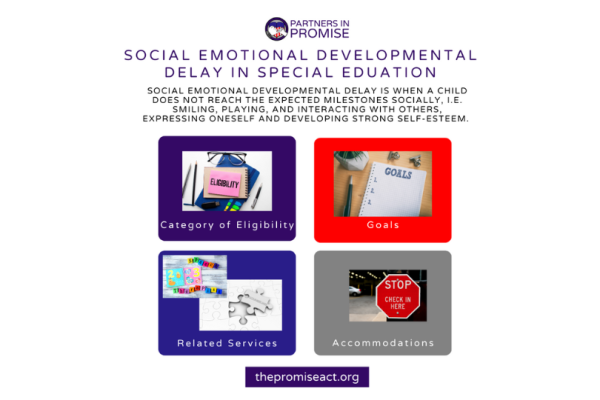
Social Emotional Developmental Delay – Let’s Talk About It!
| Developmental Delay, Featured Article
A social emotional developmental delay is often overlooked and manifests as struggles with transitions, demands, and emotional regulation. In special education, addressing these needs involves tailored goals, related services like counseling, and accommodations such as visual schedules. Parents are crucial in promoting emotional intelligence through open communication and seeking early intervention. Children can navigate these challenges and thrive with proactive support from home and school.
Social Emotional Developmental Delay in Public Schools: Navigating Challenges
When your child enters the public school system, it can be scary—even for a parent whose children have been in a “structured setting” since they were six years old and eight weeks old. As a mental health professional, I’ve always worked in foster care, school settings, and early childhood development settings. I thought I had prepared for the challenges of public school, but I had not.
I have two children in these “structured” yet caring settings where the teachers had the time to address their sensory needs. Then they entered a setting where transitions weren’t a choice, not working wasn’t a choice, and attempting to understand their perspective wasn’t always feasible. Enter a social emotional developmental delay.
What is Social Emotional Developmental Delay?
Parents and caregivers can observe a social emotional developmental delay when a child does not reach expected milestones at various ages, such as three, six, or nine months. It also occurs when a child does not reach the expected social milestones (i.e., smiling, playing, interacting with others, expressing oneself, and developing strong self-esteem).
How Can This Be Presented in the School Setting?
When a child enters the school setting, this can look like:
- Struggling with transitions
- Struggling with demands
- Displaying signs of dysregulation during requests (i.e., yelling, screaming, throwing, crying, attempting to elope)
When my children entered the school setting, the above is what occurred. I know you’re thinking, “Had this not been a struggle before?” It had, but not to this extent, why? In their previous setting, they got more support and understanding due to having less strict requirements (i.e., academics and stricter schedules) and more choices (i.e., if you don’t want to do this, you don’t have to). Another factor was that they didn’t learn the skills to navigate this strict schedule because it was not something parents had seen them endure.
What Does Social Emotional Developmental Delay Look Like in Special Education?
Both of my children would eventually receive special education services; one is Autistic, and one has a speech delay. We noted the impact of social emotional developmental delay on them and began to look at how special education can help.
Special education can address social emotional developmental delay in the following ways:
- Category of Eligibility: If your child is eligible for special education services, the eligibility category is Developmental Delay. Sometimes, Social Emotional Developmental Delay or Global Developmental Delay is listed.
- Goals: Requesting goals in the Individualized Education Plan (IEP) that address:
- Self-advocacy: Requesting breaks, wants, and needs.
- Interoception: Recognition of where they feel feelings.
- Problem-solving: Identifying problems that are triggers and how to cope and solve those problems.
- Social emotional: Labeling feelings and emotions.
- Related Services: Requesting related services like counseling, psychological, or social work services allows teaching the abovementioned skills. These services facilitate group interaction and conversation about coping skills and problem-solving.
- Speech Services: Can address pragmatic skills and social interactions.
- Accommodations: These include requesting a check–in with a trusted person, using a visual schedule or visual timer to prepare for transitions, taking extra time when transitioning, and scheduling breaks.
How Parents Can Promote Social and Emotional Development
Outside of special education services, there are various strategies parents can use to promote social emotional development:
- Talk to your children about how to label feelings and emotions, where they feel them, and how to communicate them.
- Use videos and books to read to them about those feelings, how to communicate them, and their wants and needs safely.
- Request a special education evaluation in writing to observe these transitions and demands being placed, as well as the dysregulation that can appear.
Overcoming Developmental Delays
Hearing that your child has a developmental delay can be scary. Still, you can address and work on developmental delays, especially by employing early intervention and starting preemptively addressing emotions and feelings at home. Then, as they get older, continue those conversations and support them. Once they enter the school setting, having a supportive school team also helps.
Supporting Military Children Through Transitions: Managing Stress, Fostering Growth
Military children go through many transitions, and as parents, we help them navigate that stress and have a safe place to discuss and process those feelings. They never feel alone in that process. Through this support, my children are doing pretty well, and we have been able to help them continue to thrive and grow.
About the Author

Destiny is the proud wife of an Army Armor Officer and the former military brat of a Retired CSM who served 27 years in the U.S. Army. She is a Licensed Professional Counselor, Certified Trauma-Focused Cognitive Behavior Therapist, and Certified Supervisor who has worked with military service members and their families as a mental health professional.
Destiny received a Bachelor of Science in Psychology from Georgia Southern University and a Master of Science in Clinical-Counseling Psychology from Valdosta State University. She is currently a Doctoral Candidate in the General Psychology Program at Walden University, where her research focus is on using bibliotherapy as a clinical strategy to address the unique challenges that military children face.
In 2022, Destiny received a crash course in special education and IEPs when her oldest son was diagnosed with Autism. After advocating early on for her youngest son, who has a Speech Delay, she learned the importance of having to advocate in the school setting. Destiny became a Special Education Parent Advocate and Master IEP Coach to help other families advocate for their children and prevent them from going through what her family went through.





Leave a Reply